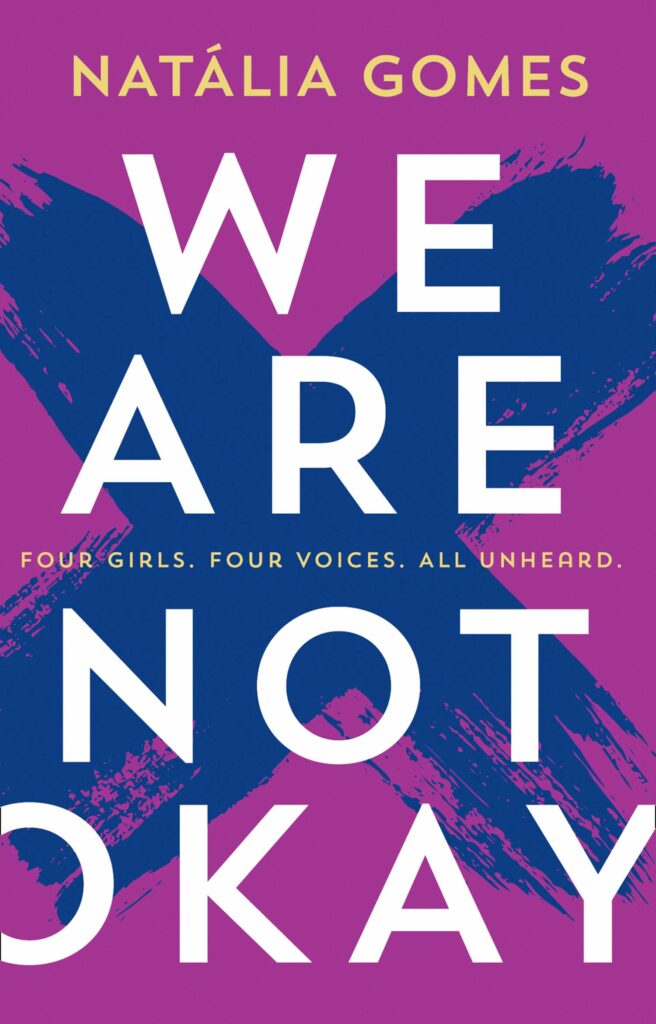Natália Gomes on the #MeToo movement and her new novel, We Are Not Okay
"Accepting that we need help doesn’t make us weak, it makes us strong."
We chatted with Nátalia Gomes all about the #MeToo movement, the importance of tackling ‘tough’ issues in YA and her poignant new novel, We Are Not Okay.
How would you describe We Are Not Okay to a potential reader?
Sophia feels pressure from her boyfriend to do things she’s not quite ready for; Lucy loves to gossip about others at school but is deep down hiding something too painful to face; Ulana’s fallen in love with a boy outside of her religion and cultural beliefs, and feels trapped by her lies; and Trina’s haunted by that night at the party, blaming herself for what happened to her. All four girls need each other more than ever, yet isolate themselves further.
The narrative of We Are Not Okay is very relevant to current news stories, what made you decide to explore such a nuanced and topical subject?
We Are Not Okay tackles issues that were occurring when I went to high school that young adults are still facing now – bullying, sexual exploitation, teen pregnancy, discrimination, and self harm. But now we live in a digital world where comments can be put online for all to see. A digital platform presents more opportunities to bully and exploit, and because of it we’re seeing a rise in cyber bullying and teen suicides. As a teacher and a writer, I want to support the courageous #MeToo movement which brings awareness to these issues.
With movements like #TimesUp and #MeToo becoming more prevalent in the media, do you think it’s important for YA to reflect movements like this?
YA is ideal for inspiring and facilitating important conversations about these types of issues. The earlier we start having these conversations, the more awareness we bring to the topic and the more progress we see with regards to making changes.

What was the inspiration behind the playlist at the beginning of the book?
Creating specific playlists for characters is usually the first thing I do when writing a new book. Thinking about what music a character would listen to helps me to develop his or her personality, and allows me to see the world through their eyes as I write their story. I learned this strategy at theatre school and found myself applying it to my writing when I first started. I still do it.
Is there a story behind any particular song choice?
I typically listen to a variety of songs and the ones I find myself being most inspired to write along to are the ones that remain in the playlist, and become character- specific.
Although different in many ways, Lucy, Ulana, Trina and Sophia are also very similar, did you have a favourite character to write or a perspective you found more challenging?
I enjoyed writing the relationship between Lucy and Trina the most, because both girls are at such odds with each other for most of the book yet are pulled together during a pivotal movement outside their school which completely changes their ‘friendship.’
We Are Not Okay discusses an array of issues many women of all ages have to face but have historically been told to keep quiet about. Why do you think it’s important for these things to be discussed more openly, both in YA and society?
I think the more awareness we bring to these issues the more change we inspire.
Do you have any recommendations for readers who loved We Are Not Okay and want to explore more books that discuss similar narratives?
The Hate U Give by Angie Thomas is an incredible YA book with a strong message about standing up for what you believe in and what’s right.
What’s one message you’d like readers to take away upon finishing We Are Not Okay?
I hope that We Are Not Okay sends the message that it’s okay to not feel okay. Accepting that we need help doesn’t make us weak, it makes us strong.
 We Are Not Okay is out now.
We Are Not Okay is out now.


